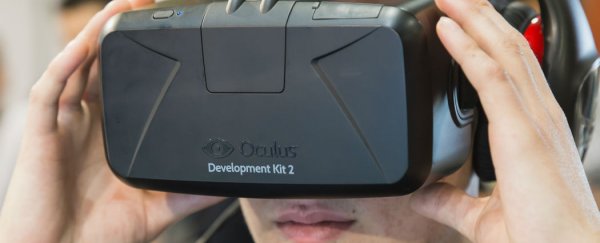There's no doubt that virtual reality is on the verge of having a major impact on the way we live our lives, with video games and movies set to be the first industries that will see some significant disruption. As the hardware and software develops, we're seeing VR kits used in a growing number of areas beyond their original remit, such as improving the lives of people with a variety of medical issues.
Take Alika Agidi-Jeffs, an aspiring musician in the UK who was diagnosed with bipolar disorder, for example. As Al Jazeera reports, researchers from King's College London are working with Agidi-Jeffs to try and improve diagnosis techniques and thus create more effective treatments using VR technology. One simulation involves getting patients on a bus and monitoring how they react to the people and events they encounter along the journey; another simulation takes place on the London Underground and includes a tube carriage breaking down.
Using public transport can often be a challenge for those suffering from schizophrenia or paranoia, if they think that other people are judging them or talking about them. So by creating a simulated environment, psychologists can work out what the mental pressure points are: exactly when patients start worrying, what kind of scenarios they're most afraid of, and so on.
Because the immersive nature of VR can create the same kind of mental and physical reactions as real life, doctors can use it to watch patients' responses first-hand and even tweak what's happening. They are then in a better position to offer advice and guidance for coping with situations back in the real world. In some cases it could be used pre-emptively to stop mental health problems before they get serious.
"We're trying to combine some of the new technologies that are coming out in the gaming industry to help people who have mental health problems," explains Lucia Valmaggia, a clinical psychologist involved in the study program, and she thinks the idea has plenty of potential. "It's not unfeasible that in the nearby future the therapist could be one of the avatars in the virtual world."
For now, only a handful of therapists are using virtual reality to treat patients, but progress is being made with those experiencing paranoia, post-traumatic stress disorder, and anxiety. With one in four people worldwide suffering from some kind of mental health issue at some point during their lives, devices like the Oculus Rift could provide a path to more effective treatment and a better chance of recovery.
In the US, the Duke University School of Medicine offers another example: virtual reality being used to treat phobias. Whatever you're afraid of - from heights to spiders - VR can help create custom-made scenarios to give doctors more insight into a condition and patients more practice at coping mechanisms. By being almost as real as real life, VR offers a host of potential applications for illness and those treating it.
